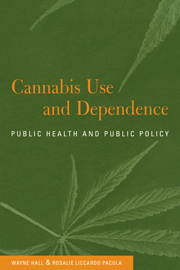Book contents
- Frontmatter
- Dedication
- Contents
- List of figures and tables
- Foreword
- Acknowledgements
- 1 Introduction
- Section 1 Cannabis the drug and how it is used
- Section 2 The health effects of cannabis
- Section 3 The psychological effects of chronic cannabis use
- Section 4 Effects on adolescent development
- Section 5 Harms and benefits of cannabis use
- Section 6 The effectiveness and costs of cannabis prohibition
- Section 7 Policy alternatives
- Appendix 1
- Appendix 2
- References
- Index
Section 6 - The effectiveness and costs of cannabis prohibition
Published online by Cambridge University Press: 05 July 2016
- Frontmatter
- Dedication
- Contents
- List of figures and tables
- Foreword
- Acknowledgements
- 1 Introduction
- Section 1 Cannabis the drug and how it is used
- Section 2 The health effects of cannabis
- Section 3 The psychological effects of chronic cannabis use
- Section 4 Effects on adolescent development
- Section 5 Harms and benefits of cannabis use
- Section 6 The effectiveness and costs of cannabis prohibition
- Section 7 Policy alternatives
- Appendix 1
- Appendix 2
- References
- Index
Summary
Proponents of cannabis law reform (Kaplan, 1970; Nadelman, 1989) argue that cannabis prohibition should be repealed because like alcohol prohibition, it has failed to deter young people from using cannabis and its social costs outweigh its benefits (Kaplan, 1970; Wodak et al., 2002). The failures of alcohol prohibition are taken to be so uncontroversial that they do not require documentation (Kyvig, 1979; Tyrrell, 1997).
Historians suggest that American experience with alcohol prohibition was a little more complicated than this (Kyvig, 1979; Tyrrell, 1997). Alcohol consumption was substantially reduced during alcohol prohibition (Kyvig, 1979; Tyrrell, 1997). There was, for example, a 30% decline in alcohol consumption immediately after prohibition as indicated by a marked and sustained reduction in liver cirrhosis deaths, hospitalisations for alcoholic psychosis and arrests for drunkenness (Miron and Zweibel, 1991). By the late 1920s consumption recovered to 60%-70% of pre-prohibition levels (Miron and Zweibel, 1991) and there was a gradual increase in consumption after repeal in 1933 but consumption did not return to pre-prohibition levels for another decade (Miron and Zweibel, 1991; MacCoun and Reuter, 2001).
Alcohol prohibition did produce a large blackmarket in Chicago and New York where it contributed to widespread corruption of police and public officials (Kyvig, 1979; Tyrrell, 1997). It is unclear how widespread lawlessness was in the remainder of the US. The public perception of widespread lawlessness under alcohol prohibition may have been amplified by Hollywood gangster movies in much the same way that the US media amplified public perceptions of a crack cocaine epidemic in the mid-1980s (Reinarman and Levine, 1989). Historical hindsight also confers a sense of inevitability on the repeal of alcohol prohibition and makes the case for repeal seem clearer than it did for the American people at the time (Kyvig, 1979), or than it does to historians and economists who have analysed the data since (Kyvig, 1979; Miron and Zweibel, 1991; Tyrrell, 1997).
The complexities of the impacts of alcohol prohibition should prompt a more critical attitude towards similar claims that cannabis prohibition has manifestly failed to deter use and that the costs of the policy ‘clearly’ outweigh its benefits.
- Type
- Chapter
- Information
- Cannabis Use and DependencePublic Health and Public Policy, pp. 155 - 158Publisher: Cambridge University PressPrint publication year: 2002



